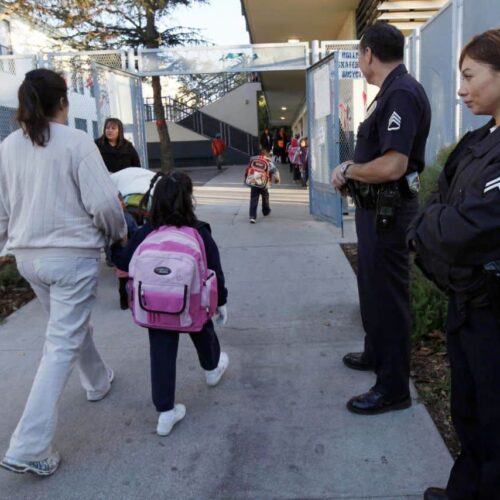Introduction
As the White House considers proposals to allocate federal money for armed guards in schools, prominent school-discipline reform groups have issued a report denouncing the idea as a misguided reaction to the Newtown school shooting.
“Placing more police in schools has significant and harmful unintended consequences for young people that must be considered before agreeing to any proposal that would increase the presence of law enforcement in schools,”says an issue brief released Friday by the Advancement Project, Dignity in Schools and other organizations.
The Advancement Project, founded in 1999, has offices in Washington D.C. and California, and has worked with school districts and states to adopt alternatives to school suspensions and expulsions. Dignity in Schools is also devoted to working with school districts, advocating fewer school suspensions and less involvement of law enforcement in school discipline.
The groups called on the White House and Congress, before they act, to consider how the school-discipline climate changed after more police were introduced to schools in response to the Columbine school shootings nearly 15 years ago in Colorado.
“We have seen what happens when [schools] ramp up police presence and other security measures in response to a shooting or other violent act. In Colorado, it resulted in more students getting arrested for minor misbehaviors, more students being pushed out of school, and a declining sense of safety in schools,” the brief says.
“These unintended consequences,” the report continues, “are persistent and pervasive – despite efforts by parents, students, and the school district, the high arrest rates and racial disparities that resulted from increased police presence and zero tolerance policies still exist.”
Vice President Joe Biden, who is leading a new White House effort on gun control and school safety, is reportedly interested in the idea of allocating federal money to schools that wish to have armed guard protection, according to a recent report by the Washington Post.
The idea is being championed by one of Congress’ most ardent liberals, Sen. Barbara Boxer, D-Calif., who told the Post that Biden is “very, very interested” in a plan she presented to finance the deployment of police officers at schools.
“I don’t see why anyone should object to it, left or right,” Boxer told the Post. “It’s an area where I think I can find common ground with my colleagues on all sides.”
Biden has met with a number of different groups this week in his role as leader of the post-Newtown effort —among them the National Rifle Association.
The NRA, under scrutiny for its intense efforts to preserve gun-ownership liberties, has suggested that schools consider training and arming teachers or other appointed staff inside schools. The NRA has offered to pay for and provide training.
“If we truly cherish our kids more than our money or our celebrities, we must give them the greatest level of protection possible and the security that is only available with a properly trained — armed — good guy,” NRA executive vice president Wayne LaPierre said at a press conference explaining the group’s recommendations.
LaPierre also urged Congress to appropriate “whatever is necessary to put armed police officers in every school.”
But in its Friday brief, the Advancement Project, whose ideas have gained traction recently in Washington, reacted with dismay to both the NRA and Boxer’s recommendations.
Following the Newtown killings, Boxer also proposed placing National Guard in schools.
“We object to using the limited resources of the federal government to expand the presence of police in schools,” the Advancement Project brief says. “More specifically, we oppose the legislation offered late last Congress by Senator Barbara Boxer to facilitate the installation of National Guard troops in U.S. schools. We cannot support any such actions that have not been shown to make schools safer and instead can lead to terrifying, fatal mistakes.”
The Advancement Project report cites specific examples of students ticketed or arrested for minor infractions in various cities with a beefed-up school police presence, including Denver, Colo., New York City and Los Angeles, as reported by the Center for Public Integrity in a series of recent stories recently.
In Denver, where parent-led reforms are now aiming to reverse harsh discipline practices, schools saw a 71 percent jump in referrals of students to police or courts between 2000 and 2004. Most referrals, the brief notes, were for minor infractions such as using obscenities, disruptive appearance and destruction of non-school property.
“Serious conduct, like carrying a dangerous weapon to school, accounted for only 7% of the referrals,” the report says.
The Obama Administration has noticed these patterns, the report also says, and has taken action to encourage or require schools to adopt alternatives to suspensions and involvement of law enforcement in discipline matters.
On Dec. 12, Advancement Project co-director Judith Browne Dianis testified at the first congressional hearing on the so-called school-to-prison pipeline. That’s a term coined by groups arguing that the involvement of police in what should be school disciplinary matters is putting some students, especially low-income minorities, on a path to more serious trouble.
Read more in Education
Juvenile Justice
Federal initiative to help schools recognize youth sex trafficking
Students suspended or expelled can become more vulnerable to exploitation
Juvenile Justice
Class-action suit challenges Massachusetts foster care system
New York advocacy group says state is not protecting kids from unfit homes, abuse and neglect





Join the conversation
Show Comments